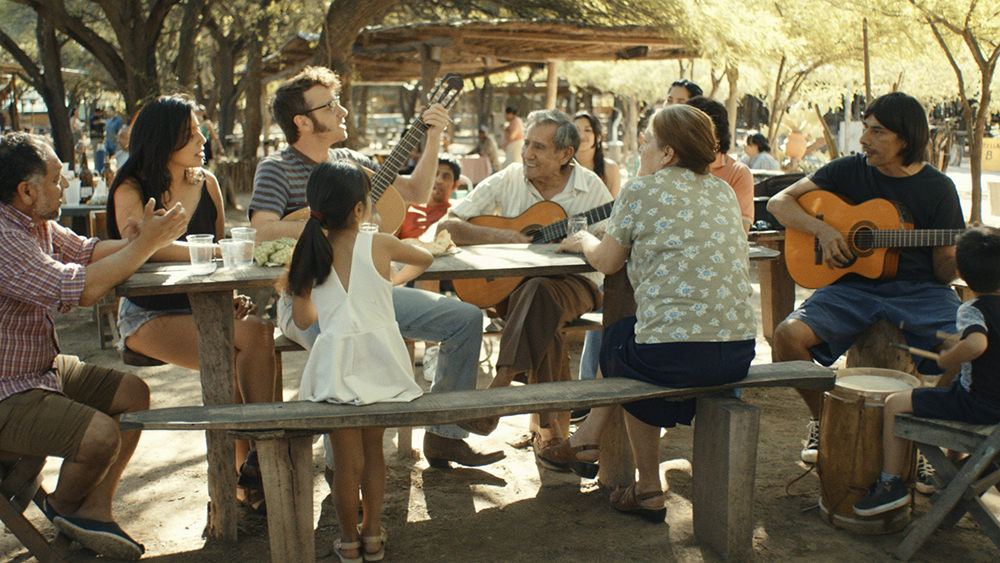
Frenetic and high-flying ‘90s rock emblem Mauricio Aznar trades his position as enigmatic frontman of Zaragoza’s Más Birras for a journey towards the soul of his craft in Spanish writer-director Javier Macipe’s highly-anticipated second feature, “The Blue Star” (“La Estrella Azul”) saw its world premiere in the New Directors strand of the San Sebastian Film Festival on Monday.
Macipe’s (“Los inconvenientes de no ser dios”) short efforts, 2014 release “Children of the River” and 2019’s “Gastos incluídos,” earned Spanish Academy Goya nominations, placing him among Variety’s 10 Spanish talents to track in 2021.
“The Blue Star,” filmed in Spain’s Zaragoza and Argentina’s Santiago de Estero and Cerro Colorado, Córdoba, poetically delves into Aznar’s introspective journey to Northern Argentina, where music isn’t a mere hobby but resides in the veins, flowing effortlessly alongside lifeblood to enrich the community.
After an encounter with an aging musician – the two, worlds apart in circumstance and style – a serendipitous exchange grows as he transitions from humble observer to ebullient participant.
The film continues as Aznar travels back to Spain, ever-changed by his experience and carrying an irreconcilable longing that leaves him tethered to the memory.
An ambitious co-production, “The Blue Star,” is backed by indie shingle MOD Producciones, Alejandro Amenábar’s regular producer, and fast-growing Latin American studio Cimarrón Cine (“The Ravaging Wind”) in tandem with El Pez Amarillo. Barcelona’s La Charito Films and Argentina’s Prisma co-produce.
International sales are handled by Film Factory Ent. (“Wild Tales”) while Wanda Vision will distribute in Spanish theaters. The cast is led by Pepe Lorente (“El Espirante”) alongside Argentine musician Cuti Carabajal, who plays his brother Carlos, and rounded out by Bruna Cusí (“Fácil”), Marc Rodriguez (“Spleen”), Mariela Carabajal, Noelia Verenice Díaz and Catalina Sopelana.
Ahead of the film’s debut, Macipe spoke with Variety about Aznar’s legacy, the challenges of production and the warm-hearted nature of the Argentine countryside.
What was it about Mauricio Aznar that prompted you to turn his story into a film?
Great stories have to be told sooner or later. By fate, Mauricio’s mother and I crossed paths 18 years ago and she gave me the idea of making a film about her son, who’d just died. Mauricio was a kind of John Lennon, a “Sugarman.” He died young but was an old soul, he’d known the deep pain of his countrymen and renounced fame to be faithful to his mission. For me, that’s what it means to be a true artist. And, as an artist, what better theme could there be for a movie?
Can you speak to the ambitious filming process between Spain and Argentina?
It’s an ambitious film because there are many scenes of massive concerts. I wanted everything to be recorded live, with a real audience. We started filming in 2020 and had to stop on the third day of filming due to the pandemic.
Since then, everything’s been extended with the outbreaks of the virus, fights against financial problems, inflation in Argentina, technicians who got off the boat, even deaths of key people on the team. The only way to summarize it? It’s been a very hard process, full of resistance, which has been sustained because we had a very deep motivation from the heart and many friends supporting us.
When did you know the lead role would go to Pepe Lorente?
There was a casting exercise and after a meditation I asked the actor, with his eyes closed, without thinking, to let Mauricio speak through him, as if he were a medium. I really heard Mauricio.
It’s almost impossible to explain and it was difficult for me to convince the producers that he was the right person, because everything was based on a somewhat ethereal feeling. Seeing the result, everyone thinks we got it right.
There’s a warmth, curiosity and a feeling of being welcomed in Argentina that just doesn’t exist elsewhere in the same capacity. Can you speak to incorporating that into the film and how the entire experience had an impact on Mauricio and your crew during filming?
10 years ago, I made my first trip to Argentina, repeating Mauricio’s trip. I’d booked hotels, but I ended up sleeping alone in musicians’ houses. Argentina, and even more so Santiago de Estero, is a land accustomed to perpetual crises. It’s common to find that brother willing to offer you everything he has and open his house to you. Shared poverty can be transformed into joy.
The team never stopped getting excited about this every day and several people have told me that this trip has been the most transformative of their lives. Mauricio learned this and opened his house to everyone.













